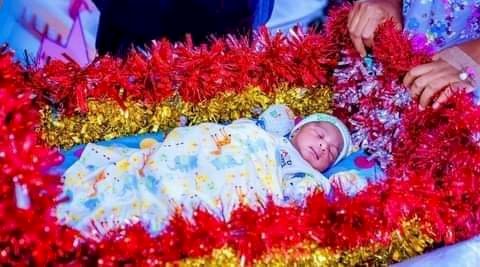First Lady welcomes baby of the year 2021 with gifts in Abuja

The First Lady, Aisha Buhari, on Friday, welcomed baby Aliyu Adamu Abubakar, the first baby of the year 2021, born at 12 a.m. at Karu Primary Healthcare Centre, FCT, Abuja.
The baby was born into the family of Mr and Mrs Adamu Abubakar, an indigene of Biu Local Government Area of Borno.
The president’s wife, who arrived at the Karu Healthcare Centre at about 2.30 p.m. on Friday, urged pregnant women to always go for ante-natal care for safe delivery.
She advised couples to embrace child spacing methods to ensure healthy mothers and babies.
Mrs Buhari, who was represented by Dr Mairo Al-Makura, the Special Assistant to the President on African First Lady’s Peace Mission, said child spacing was key to sustaining the health and wellbeing of mothers and their babies.
She emphasised the importance of exclusive breastfeeding, saying six months of the process would benefit both mother and child and for babies to acquire the necessary nutrients for healthy growth.
She said “I want to use this opportunity to rejoice with you on this special day and urge you to ensure that your children are exclusively breastfed and immunised at the early stage of their lives.
“I also want to use this medium to appeal to mothers on the need to ensure hygienic environment and register your children during childbirth to assist government to have accurate database for the purpose of planning for the next generation.”
The first lady presented baby kits, including sanitary items to nursing mothers in the medical facility.
Responding, the parents of the baby of the year, expressed gratitude to the first lady for visiting them and for the kind gesture.
The Head of Karu Primary Healthcare Centre, Dr Akila Udoji, who also thanked the first lady for the visit, said the medical facility required additional manpower to take care of the number of patients that visit it.
The head said there was an increase in the number of patients who go to the hospital, especially from neighbouring communities.


















































